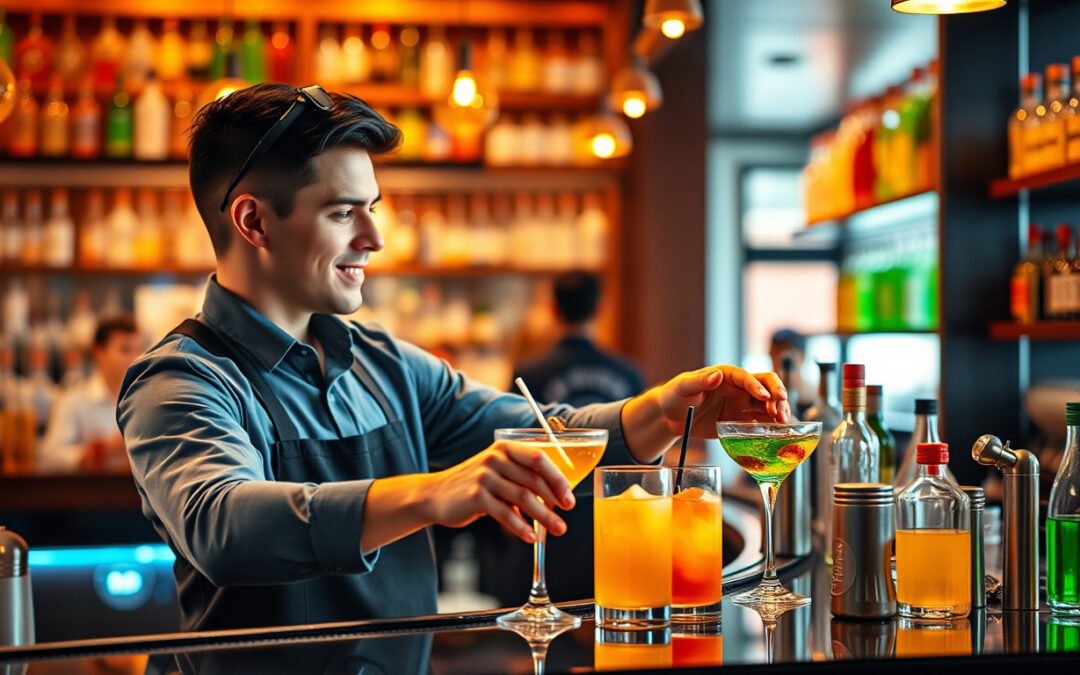Providing alcohol in a bar, restaurant, club, or event venue brings heavy duties.
Alcohol service connects with safety, legality, and professionalism.
Responsible Beverage Vendor Training builds a link between staff and legal rules.
This training ties servers and managers to clear rules and practices that slow overconsumption, underage drinking, and bad behavior.
In this article, we connect key practices in Responsible Beverage Vendor Training to safer communities and better business.
What Is Responsible Beverage Vendor Training?
Responsible Beverage Vendor Training means courses that join alcohol service practices with legal and safe methods.
This training connects alcohol sellers to local and state laws while teaching safe service.
The goal is simple: safe use, fewer alcohol-related harms, and full legal compliance.
Training covers skills such as:
- Recognizing and handling intoxicated customers
- Checking and verifying IDs to stop underage drinking
- Managing tough situations with care
- Understanding legal risks related to alcohol service
These skills link the safety of customers to a business’s good reputation and legal health.
Why Is Responsible Beverage Vendor Training Important?
Serving alcohol carries risks like drunk driving, violence, and health issues.
Without training, staff may link to these problems by mistake.
Responsible Beverage Vendor Training offers clear benefits:
1. Reduces Liability Risk
Proper service techniques tie staff actions to reduced legal penalties.
Knowledgeable employees show the business connects with law and care.
2. Prevents Underage Drinking
The training links identification checks to stopping sales to minors.
Staff learn to spot fake IDs and challenge doubtful identification.
3. Promotes Safe Consumption
Recognizing signs of intoxication helps staff limit alcohol service.
This connection lessens the chance of alcohol-related incidents.
4. Enhances Customer Experience
Professional service ties to a safe, friendly environment.
This link improves overall patron experience and encourages return visits.
Key Components of Responsible Beverage Vendor Training
Effective training ties several essential parts together:
A. Comprehensive Legal Guidelines
Trainees connect with local, state, and federal alcohol laws.
They learn about sale hours, license rules, penalties, and reporting.
B. Identification Verification Techniques
The training shows methods to check IDs, spot fakes, and handle doubts with care.
C. Recognizing Signs of Intoxication
Servers learn to connect behavior and physical signs like slurred speech or poor motor skills with intoxication.
D. Refusal of Service Protocol
Trainees connect polite yet firm refusals with conflict de-escalation and safety steps.
E. Handling Difficult Situations
The training ties conflict resolution skills to techniques for managing disruptive patrons.
F. Record-Keeping and Incident Reporting
Recording incidents helps businesses connect events with compliance and safety checks.
Implementing Responsible Beverage Vendor Training Effectively
For the training to make a lasting connection, it must be applied carefully:
1. Choose Accredited Training Providers
Reputable programs connect with state or local law.
They tie training delivery to the required legal standards.
2. Make Training Mandatory for All Staff
Everyone who serves alcohol—bartenders to managers—must share this training before starting work.
3. Schedule Regular Refresher Courses
Since alcohol laws and methods change over time, ongoing training connects new developments with staff skills.
4. Use Interactive and Scenario-Based Learning
Role-playing and quizzes tie real-life scenarios to solid learning, boosting memory.
5. Monitor Compliance and Effectiveness
Businesses should track how well staff connect training with on-floor performance.
This link helps reduce alcohol-related incidents over time.
Five Essential Practices in Responsible Beverage Vendor Training
Below are five core practices that tie the training together:
-
Always Verify Age with Valid ID:
Check IDs carefully and challenge any that seem false. -
Recognize Intoxication Early:
Notice signs of intoxication and act before trouble starts. -
Refuse Service When Necessary:
Use a clear and polite refusal to keep service safe and legal. -
Maintain Professionalism and Respect:
Treat every customer with courtesy, which links to a calm environment. -
Report and Document Incidents:
Record refusals and incidents to keep an accurate account for accountability.
Benefits Beyond Compliance: Why Responsible Service Matters
Following the law is key.
Yet, responsible alcohol service connects to so much more.
A community that ties responsible consumption to everyday life sees fewer accidents and crimes.
Business that values Responsible Beverage Vendor Training ties good relations with local authorities and happy patrons.

According to a report by the National Institute on Alcohol Abuse and Alcoholism (NIAAA), education and policies that stress responsible alcohol sales have helped reduce impaired driving and underage drinking over time.
Frequently Asked Questions (FAQs)
What Is Responsible Beverage Vendor Training Certification?
Certification connects to an official record proving that an employee has learned safe, legal service practices.
Many states require this connection as a must for alcohol servers.
How Long Does Responsible Beverage Vendor Training Take?
The duration ties to the program type, ranging from 2 to 6 hours.
Some courses tie into an online format while others use in-person classes.
Can Responsible Beverage Vendor Training Prevent Alcohol-Related Incidents?
No training can tie every risk to zero.
Still, this training connects essential knowledge and skills that reduce over-service and underage sales.
Conclusion
Responsible Beverage Vendor Training ties together safe and legal alcohol service habits.
By ensuring employees connect with their roles and legal duties, businesses link with safety, law, and customer care.
Strong training programs, regular refreshers, and clear practices like ID checks and refusal of service create safer venues.
This connection protects your business, your customers, and your community.
For more details on state rules and accredited training programs, connect with your local alcohol control board or health department.
Choosing Responsible Beverage Vendor Training is a clear investment in lasting safety and success.


